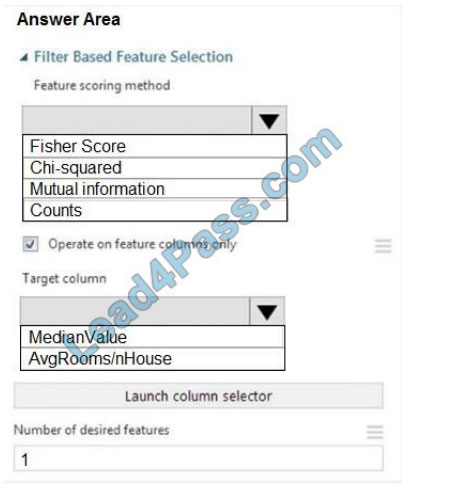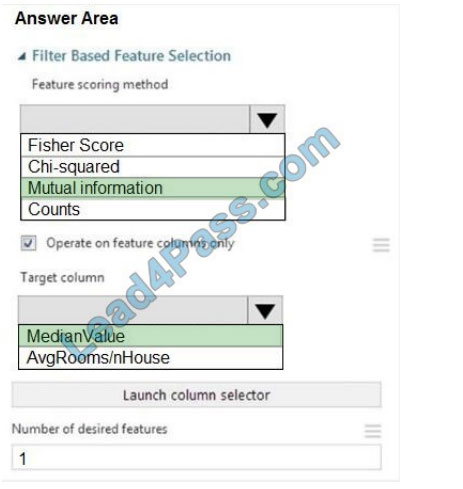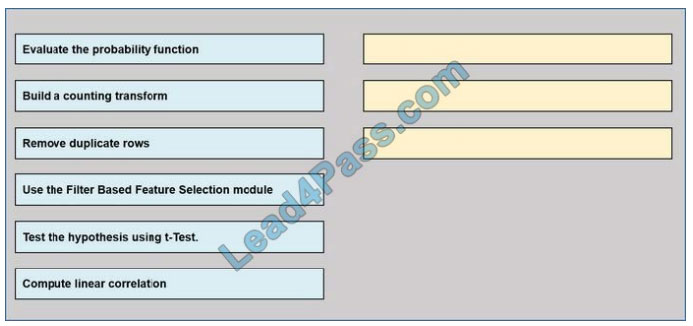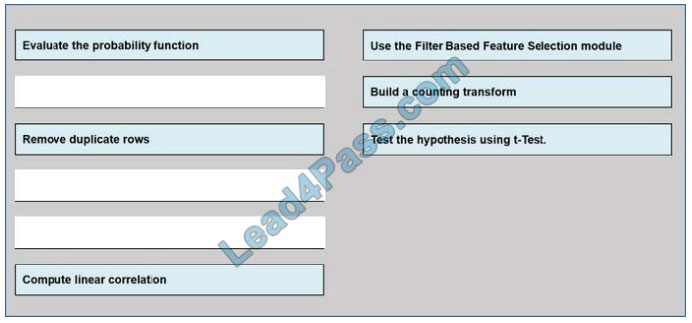How do I get the latest Azure DP-100 exam practice question tips? Brain2dumps shares the latest DP-100 exam dumps, DP-100 pdf,
And online hands-on testing free to improve skills and experience, 98.5% of the test pass rate selected leads4pass DP-100 dumps: https://www.leads4pass.com/dp-100.html (latest update)
Latest updates Microsoft Azure DP-100 video tutorial 2022
Microsoft Azure dp-100 exam pdf free download
[PDF Q1-Q13] Free Microsoft DP-100 pdf dumps download from Google Drive: https://drive.google.com/open?id=1ivuMI2KAwmZmsPjmEiO0TXsfU77hI1Km
[PDF 2022] Free Microsoft DP-100 pdf dumps download from Google Drive: https://drive.google.com/file/d/1ERokPE8byaytg4mD7AOm74gY88zqIB-j/view?usp=sharing
Exam DP-100: Designing and Implementing a Data Science Solution on Azure: https://docs.microsoft.com/en-us/learn/certifications/exams/dp-100
Skills measured
- The content of this exam will be updated on May 22, 2020. Please download the skills measured document below to see what will be changing.
- Set up an Azure Machine Learning workspace (30-35%)
- Run experiments and train models (25-30%)
- Optimize and manage models (20-25%)
- Deploy and consume models (20-25%)
Real and effective Microsoft Azure DP-100 exam Practice Questions
QUESTION 1
You use the Two-Class Neural Network module in Azure Machine Learning Studio to build a binary classification model.
You use the Tune Model Hyperparameters module to tune the accuracy for the model.
You need to configure the Tune Model Hyperparameters module.
Which two values should you use? Each correct answer presents part of the solution.
NOTE: Each correct selection is worth one point.
A. Number of hidden nodes
B. Learning Rate
C. The type of the normalizer
D. Number of learning iterations
E. Hidden layer specification
Correct Answer: DE
D: For Number of learning iterations, specify the maximum number of times the algorithm should process the training
cases.
E: For Hidden layer specification, select the type of network architecture to create.
Between the input and output layers, you can insert multiple hidden layers. Most predictive tasks can be accomplished
easily with only one or a few hidden layers.
References:
https://docs.microsoft.com/en-us/azure/machine-learning/studio-module-reference/two-class-neural-network
QUESTION 2
You are developing a hands-on workshop to introduce Docker for Windows to attendees.
You need to ensure that workshop attendees can install Docker on their devices.
Which two prerequisite components should attendees install on the devices? Each correct answer presents part of the
solution.
NOTE: Each correct selection is worth one point.
A. Microsoft Hardware-Assisted Virtualization Detection Tool
B. Kitematic
C. BIOS-enabled virtualization
D. VirtualBox
E. Windows 10 64-bit Professional
Correct Answer: CE
C: Make sure your Windows system supports Hardware Virtualization Technology and that virtualization is enabled.
Ensure that hardware virtualization support is turned on in the BIOS settings. For example:
E: To run Docker, your machine must have a 64-bit operating system running Windows 7 or higher.
References:
https://docs.docker.com/toolbox/toolbox_install_windows/
https://blogs.technet.microsoft.com/canitpro/2015/09/08/step-by-step-enabling-hyper-v-for-use-on-windows-10/
QUESTION 3
You plan to build a team data science environment. Data for training models in machine learning pipelines will be over
20 GB in size.
You have the following requirements:
Models must be built using Caffe2 or Chainer frameworks.
Data scientists must be able to use a data science environment to build the machine learning pipelines and train models
on their personal devices in both connected and disconnected network environments.
Personal devices must support updating machine learning pipelines when connected to a network.
You need to select a data science environment.
Which environment should you use?
A. Azure Machine Learning Service
B. Azure Machine Learning Studio
C. Azure Databricks
D. Azure Kubernetes Service (AKS)
Correct Answer: A
The Data Science Virtual Machine (DSVM) is a customized VM image on Microsoft\\’s Azure cloud built specifically for
doing data science. Caffe2 and Chainer are supported by DSVM. DSVM integrates with Azure Machine Learning.
Incorrect Answers:
B: Use Machine Learning Studio when you want to experiment with machine learning models quickly and easily, and the
built-in machine learning algorithms are sufficient for your solutions.
References: https://docs.microsoft.com/en-us/azure/machine-learning/data-science-virtual-machine/overview
QUESTION 4
Your team is building a data engineering and data science development environment. The environment must support
the following requirements:
1.
support Python and Scala
2.
compose data storage, movement, and processing services into automated data pipelines
3.
the same tool should be used for the orchestration of both data engineering and data science
4.
support workload isolation and interactive workloads
5.
enable scaling across a cluster of machines
You need to create the environment.
What should you do?
A. Build the environment in Apache Hive for HDInsight and use Azure Data Factory for orchestration.
B. Build the environment in Azure Databricks and use Azure Data Factory for orchestration.
C. Build the environment in Apache Spark for HDInsight and use Azure Container Instances for orchestration.
D. Build the environment in Azure Databricks and use Azure Container Instances for orchestration.
Correct Answer: B
In Azure Databricks, we can create two different types of clusters. Standard, these are the default clusters and can be
used with Python, R, Scala, and SQL High-concurrency
Azure Databricks is fully integrated with Azure Data Factory.
Incorrect Answers:
D: Azure Container Instances are good for development or testing. Not suitable for production workloads.
References: https://docs.microsoft.com/en-us/azure/architecture/data-guide/technology-choices/data-science-andmachine-learning
QUESTION 5
DRAG DROP
You configure a Deep Learning Virtual Machine for Windows.
You need to recommend the tools and frameworks to perform the following:
Build a deep run.il network (DNN) models.
Perform interactive data exploration and visualization.
Which tools and frameworks should you recommend? To answer, drag the appropriate tools to the correct tasks. Each
tool may be used once, more than once, or not at all. You may need to drag the split bar between panes or scroll to
view
content.
NOTE: Each correct selection is worth one point.
Select and Place:
Correct Answer:

QUESTION 6
You are developing deep learning models to analyze semi-structured, unstructured, and structured data types.
You have the following data available for model building:
Video recordings of sporting events
Transcripts of radio commentary about events
Logs from related social media feed captured during sporting events
You need to select an environment for creating the model.
Which environment should you use?
A. Azure Cognitive Services
B. Azure Data Lake Analytics
C. Azure HDInsight with Spark MLib
D. Azure Machine Learning Studio
Correct Answer: A
Azure Cognitive Services expand on Microsoft\\’s evolving portfolio of machine learning APIs and enable developers to
easily add cognitive features? such as emotion and video detection; facial, speech, and vision recognition; and speech
and language understanding? into their applications. The goal of Azure Cognitive Services is to help developers create
applications that can see, hear, speak, understand, and even begin to reason. The catalog of services within Azure
Cognitive Services can be categorized into five main pillars – Vision, Speech, Language, Search, and Knowledge.
References: https://docs.microsoft.com/en-us/azure/cognitive-services/welcome
QUESTION 7
You need to configure the Feature-Based Feature Selection module based on the experiment requirements and
datasets.
How should you configure the module properties? To answer, select the appropriate options in the dialog box in the
answer area.
NOTE: Each correct selection is worth one point.
Hot Area:

Correct Answer:

Box 1: Mutual Information.
The mutual information score is particularly useful in feature selection because it maximizes the mutual information
between the joint distribution and target variables in datasets with many dimensions.
Box 2: MedianValue
MedianValue is the feature column, it is the predictor of the dataset.
Scenario: The MedianValue and AvgRoomsinHouse columns both hold data in numeric format. You need to select a
feature selection algorithm to analyze the relationship between the two columns in more detail.
References: https://docs.microsoft.com/en-us/azure/machine-learning/studio-module-reference/filter-based-featureselection
QUESTION 8
Note: This question is part of a series of questions that present the same scenario. Each question in the series contains
a unique solution that might meet the stated goals. Some question sets might have more than one correct solution,
while others might not have a correct solution.
After you answer a question in this section, you will NOT be able to return to it. As a result, these questions will not
appear on the review screen.
You are creating a model to predict the price of a student\\’s artwork depending on the following variables: the
student\\’s length of education, degree type, and art form.
You start by creating a linear regression model.
You need to evaluate the linear regression model.
Solution: Use the following metrics: Accuracy, Precision, Recall, F1 score, and AUC.
Does the solution meet the goal?
A. Yes
B. No
Correct Answer: B
Those are metrics for evaluating classification models, instead, use: Mean Absolute Error, Root Mean Absolute Error,
Relative Absolute Error, Relative Squared Error, and the Coefficient of Determination.
References: https://docs.microsoft.com/en-us/azure/machine-learning/studio-module-reference/evaluate-model
QUESTION 9
DRAG DROP
You are producing a multiple linear regression model in Azure Machine learning Studio.
Several independent variables are highly correlated.
You need to select appropriate methods for conducting elective feature engineering on all the data;
Which three actions should you perform in sequence? To answer, move the appropriate actions from the list of actions
to the answer area and arrange them in the correct order.
Select and Place:
Correct Answer:

QUESTION 10
You are implementing a machine learning model to predict stock prices. The model uses a PostgreSQL database and
requires GPU processing.
You need to create a virtual machine that is pre-configured with the required tools.
What should you do?
A. Create a Data Science Virtual Machine (DSVM) Windows edition.
B. Create a Geo Al Data Science Virtual Machine (Geo-DSVM) Windows edition.
C. Create a Deep Learning Virtual Machine (DLVM) Linux edition.
D. Create a Deep Learning Virtual Machine (DLVM) Windows edition.
E. Create a Data Science Virtual Machine (DSVM) Linux edition.
Correct Answer: E
Incorrect Answers:
A, C: PostgreSQL (CentOS) is only available in the Linux Edition.
B: The Azure Geo AI Data Science VM (Geo-DSVM) delivers geospatial analytics capabilities from Microsoft\\’s Data
Science VM. Specifically, this VM extends the AI and data science toolkits in the Data Science VM by adding ESRI\\’s
market-leading ArcGIS Pro Geographic Information System.
D: DLVM is a template on top of the DSVM image. In terms of the packages, GPU drivers, etc are all there in the DSVM
image. Mostly it is for convenience during creation where we only allow DLVM to be created on GPU VM instances on
Azure.
References: https://docs.microsoft.com/en-us/azure/machine-learning/data-science-virtual-machine/overview
QUESTION 11
You are moving a large dataset from Azure Machine Learning Studio to a Weka environment.
You need to format the data for the Weka environment. Which module should you use?
A. Convert to CSV
B. Convert to Dataset
C. Convert to ARFF
D. Convert to SVMLight
Correct Answer: C
Use the Convert to ARFF module in Azure Machine Learning Studio, to convert datasets and results in Azure Machine
Learning to the attribute-relation file format used by the Weka toolset. This format is known as ARFF.
The ARFF data specification for Weka supports multiple machine learning tasks, including data preprocessing,
classification, and feature selection. In this format, data is organized by entities and their attributes and is contained in a
single text file.
References: https://docs.microsoft.com/en-us/azure/machine-learning/studio-module-reference/convert-to-arff
QUESTION 12
You are solving a classification task.
You must evaluate your model on a limited data sample by using k-fold cross-validation. You start by configuring a k
parameter as the number of splits.
You need to configure the k parameter for the cross-validation.
Which value should you use?
A. k=0.5
B. k=0
C. k=5
D. k=1
Correct Answer: C
Leave One Out (LOO) cross-validation
Setting K = n (the number of observations) yields n-fold and is called leave-one-out cross-validation (LOO), a special
case of the K-fold approach.
LOO CV is sometimes useful but typically doesn\\’t shake up the data enough. The estimates from each fold are highly
correlated and hence their average can have high variance. This is why the usual choice is K=5 or 10. It provides a
good compromise for the bias-variance tradeoff.
QUESTION 13
You are creating a machine learning model.
You need to identify outliers data;
Which two visualizations can you use? Each correct answer presents a complete solution.
NOTE: Each correct selection is worth one point.
A. box plot
B. scatter
C. random forest diagram
D. Venn diagram
E. ROC curve
Correct Answer: AB
Share leads4pass discount codes for free 2020-2023

leads4pass Reviews
leads4pass offers the latest exam exercise questions for free! Microsoft exam questions are updated throughout the year.
leads4pass has many professional exam experts! Guaranteed valid passing of the exam! The highest pass rate, the highest cost-effective!
Help you pass the exam easily on your first attempt.

What you need to know:
Brain2dumps shares the latest Microsoft DP-100 dumps, DP-100 pdf, DP-100 exam exercise questions for free. You can improve your skills and exam experience online to get complete exam questions and answers guaranteed to pass the exam we recommend leads4pass DP-100 dumps.
Latest update leads4pass DP-100 dumps: https://www.leads4pass.com/dp-100.html (311 Q&As)
[Q1-Q13 PDF] Free Microsoft DP-100 pdf dumps download from Google Drive: https://drive.google.com/open?id=1ivuMI2KAwmZmsPjmEiO0TXsfU77hI1Km
[PDF 2022] Free Microsoft DP-100 pdf dumps download from Google Drive: https://drive.google.com/file/d/1ERokPE8byaytg4mD7AOm74gY88zqIB-j/view?usp=sharing
Comments are closed.